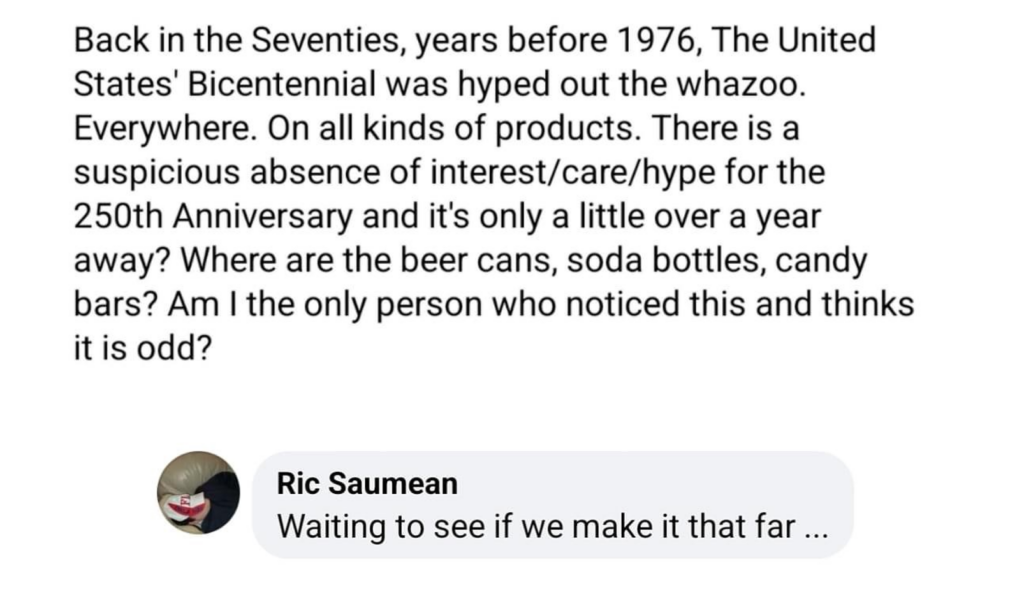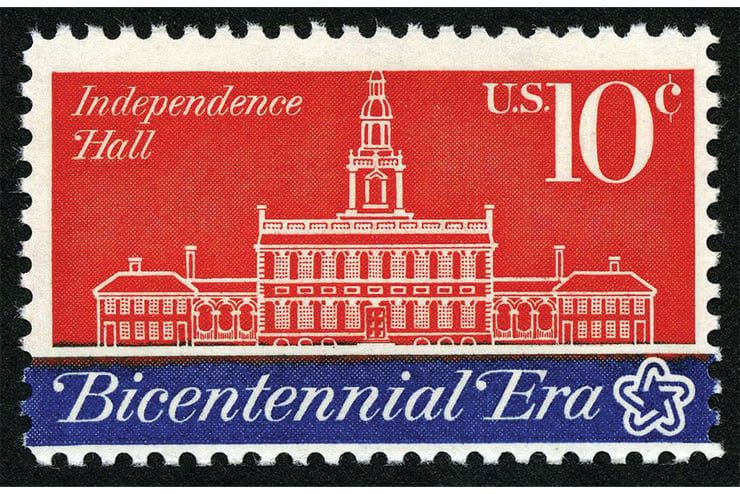Recently, I came across an interesting online exchange. A Facebook poster expressed puzzlement over the apparent lack of interest in America’s coming semiquincentennial in 2026. In response, a commenter wrote simply, “Waiting to see if we make it that far…”

The silence is odd, the poster argued, because the lead-up to America’s Bicentennial in 1976 generated endless hype and public interest, and not just for history buffs. The hype surrounding both the 1976 Bicentennial and the 1987 Bicentennial of the U.S. Constitution was so intense that both events inspired in me an intense interest and curiosity about American history.
Yet it hadn’t even occurred to me until seeing that post that America’s 250th birthday is just around the corner. Naturally, my first question was, “Why am I and, apparently, most Americans feeling this lack of enthusiasm?”
Perhaps the commenter is right. Americans may be uninterested in celebrating this coming milestone because they are on edge about whether “we make it that far.” Or, perhaps, Americans are uninterested because they don’t want to take part in the hypocrisy of celebrating the “birthday” of an already dead regime.
By calling America “an already dead regime” I, of course, don’t mean that the country called the United States of America no longer exists. I mean that its soul has been drained out, even as the body politic lives on. Celebrating America as it is now and pretending that it is, in any real or meaningful sense, the heir to the work of the Founding Fathers is more than a stretch. In what sense may we say that the United States of America, in its current form, is connected to the regime born out of the American Revolution?
America may still wear the parchment-colored vestments of our founding, but it doesn’t adhere to the same political creed or even worship at the same altar as its founders. Some forms of the old Constitution may still apply—we still recognize only three branches of government, for example. But the truth is that our real
government is composed of thousands of nameless, faceless, unelected career bureaucrats advancing an ever-leftward press for more control of the citizens.
Yes, we still have a bicameral legislature composed of members of the House of Representatives and the Senate, but we have given up on expecting it to be held accountable for the legislation it passes. Instead, lawmakers pass the buck to a vast administrative state that requires not only our money but our ongoing servitude. That governing apparatus does the bidding of the expert and donor classes, and we are supposed to be grateful to them for their wisdom and for “keeping up with the times.”
We still elect (or, perhaps, we think we elect) a president who is said to oversee this bureaucracy—this so-called executive branch of government. But today it is unclear whether the bureaucracy answers to the president or if he must answer to them. And, of course, we still have what people are pleased to call an independent judiciary. But their “independence” now appears to be independence from the Constitution itself.
The forms of the original Constitution, therefore, no longer hold much power over the moral imaginations of citizens or our elected politicians. And we think nothing of changing our understanding of those forms if the “times” or the power of a political faction demand it. In short, the Constitution is not, in any way, sacred to us.
In government schools, our children are taught that our founding was the work of racist, sexist, slaveholding bigots who only wanted to protect their economic interests, kill Indians, and probably didn’t even ask people what their preferred pronouns were. Are we surprised, then, that young people don’t want to celebrate that?
The gloss on the pious left’s narrative is that America is to be celebrated because of what it is becoming—the evolving utopia where history’s injustices will finally be avenged, and the people will be ruled in accordance with the left’s own expertise and wisdom. This dreamy potential is the American story for them—and those who cannot be excited by it are the kind of retrograde deplorables Joe Biden decried in his recent State of the Union address. In other words, the kind of people the left think have it coming.
So, if Americans are hesitant to celebrate the coming 250th anniversary of our Declaration of Independence and founding as a nation, it would be hard to blame them. What, exactly, would they be celebrating: a previous regime they have been taught to believe was evil or a coming regime that they can readily see is evil?
For those like me who look back upon America’s founding and see in it principles that were worthy of defending because they were worthy of free and self-governing men, there is little to do but mourn its passing. We can and should remember that regime. We may even be hopeful of a potential resurrection. But we cannot, rightly, call this doppelganger going by the name “United States of America” the same regime as the regime of our founders. Celebrating the occasion of America’s birth as if it had not already slipped away and become something else is to take part in a lie.

Leave a Reply